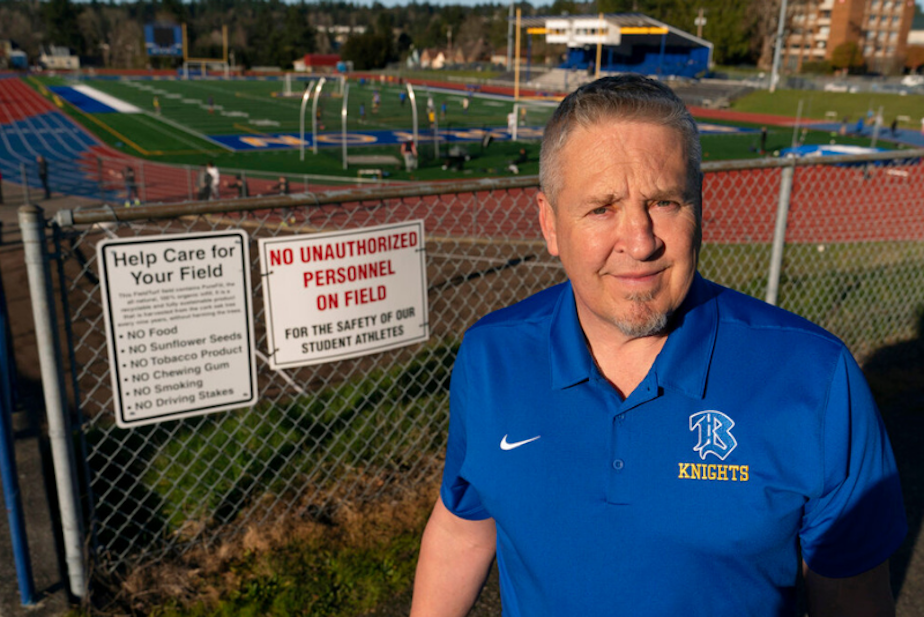U.S. Supreme Court backs Bremerton coach who prayed on football field

The United States Supreme Court has ruled in favor of a Bremerton football coach who was fired for praying at the 50 yard line after each game.
Seven years after Assistant Football Coach Joe Kennedy made headlines by refusing to stop praying on the field, the Supreme Court has sided with him. In a 6-3 decision, which fell along Conservative/Liberal lines, the court said that, as an individual, Kennedy should have been allowed to pray on the football field.
According to the Court's opinion, written by Justice Neil Gorsuch:
"Joseph Kennedy lost his job as a high school football coach because he knelt at midfield after games to offer a quiet prayer of thanks. Mr. Kennedy prayed during a period when school employees were free to speak with a friend, call for a reservation at a restaurant, check email, or attend to other personal matters. He offered his prayers quietly while his students were otherwise occupied. Still, the Bremerton School District disciplined him anyway. It did so because it thought anything less could lead a reasonable observer to conclude (mistakenly) that it endorsed Mr. Kennedy’s religious beliefs. That reasoning was misguided.
...The Constitution and the best of our traditions counsel mutual respect and tolerance, not censorship and suppression, for religious and nonreligious views alike."
The court also acknowledges that players and others began praying with the coach, even in locker rooms, and that Kennedy also incorporated religious messages in motivational speeches.
The Court concluded:
"Respect for religious expressions is indispensable to life in a free and diverse Republic—whether those expressions take place in a sanctuary or on a field, and whether they manifest through the spoken word or a bowed head. Here, a government entity sought to punish an individual for engaging in a brief, quiet, personal religious observance doubly protected by the Free Exercise and Free Speech Clauses of the First Amendment. And the only meaningful justification the government offered for its reprisal rested on a mistaken view that it had a duty to ferret out and suppress."
Sponsored
In other words, the Court ruled that the district was mistaken; Coach Kennedy's prayers were private and players were not required to join him, and therefore there was no conflict for the district to fix through firing him.
Justice Sonia Sotomayor authored the dissenting opinion and argued that he Court has consistently ruled in the past that, "school officials leading prayer is constitutionally impermissible."
Sotomayor says that the majority justices misconstrued the facts, and ignored that Kennedy, as a public school employee, was often joined on the field by students.
Sotoymayor further states that the majority failed "to acknowledge the unique pressures faced by students when participating in school-sponsored activities. This decision does a disservice to schools and the young citizens they serve, as well as to our Nation’s longstanding commitment to the separation of church and state. I respectfully dissent."
Bremerton coach prays on the football field
Kennedy had a practice of praying on the football field for years before it created a stir in 2015. The prayers drew the attention of district officials who stepped in to enforce a line between religion and government. As a public employee, the Bremerton School District requested he stop as it would could be construed as government endorsing a religion. Kennedy was being joined on the field by students and players. He says that he did not invite anyone, and that it was their choice to join him during the prayer. Though the Supreme Court's opinion notes that, in the three games the district cited in Kennedy's firing, no players joined him on the field in prayer.
After Kennedy opted not to cease praying after games, local Satanists began attending the games, too, and held ceremonies on the field — because when you open the door to one religion on government property, they all come.
After his firing, the First Liberty Institute took on the case. The district's decision was upheld all the way to the Supreme Court, which opted to go another way and favor Kennedy's position of praying on the field.

